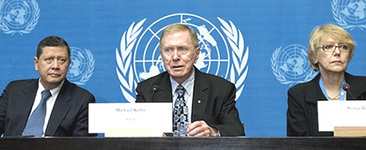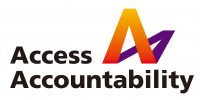Introduction: UN COI
On March 21, 2013, the UN Human Rights Council established the Commission of Inquiry (CoI) on Human Rights in the Democratic People’s Republic of Korea (DPRK, North Korea). A CoI is a diplomatic tool in which a delegation of legal experts or diplomats is tasked with the investigation of a large-scale human rights abuse. Often, the aim is to determine those responsible for atrocities committed. Over the last several years, the UN has used the CoI mechanism to make prima facie determinations of breaches of international law, before an official tribunal is established.
UN COI for the DPRK
The CoI for the DPRK was mandated to investigate systematic, widespread and grave violations of human rights within the DPRK over the course of one year. It was to look into the question of criminal accountability and decide whether the violations amounted to crimes against humanity. It focused on nine areas of violations: the right to food, those associated with prison camps, torture and inhumane treatment, arbitrary detention, discrimination, freedom of expression, the right to life, freedom of movement, and enforced disappearances (both of North Korean nationals and of foreigners).
A large part of the investigative process relied on amassing and analyzing the information released through victims’ testimonies, survivors’ accounts and witnesses. If the crimes were considered crimes against humanity in international law, the CoI would be responsible for drafting recommendations for the DPRK government.

The CoI was composed of three “eminent persons”: one Special Rapporteur (Marzuki Darusman, Indonesia) and two other commissioners who functioned independently of the Council and High Commissioner’s Office: Michael Kirby (Australia) and Sonja Biserko (Serbia). In addition to the year of primary investigation, the Special Rapporteur was allowed a one-year extension to follow up on the human rights situation in the DPRK.
How was the UN COI for DPRK Established?
A powerful impetus for the CoI came from the testimonies of North Korean refugees who had relocated to South Korea in the 1990s and 2000s. Though their plight was not new, the awareness generated by the stories of their lives in North Korea and their subsequent escape, shared by journalists, scholars, and human rights activists, allowed the human rights situation in the DPRK to take on a greater sense of urgency.
As awareness of the reality of the situation grew, so did the body of research and advocacy on the part of various NGOs. Reports of groups such as Freedom House and Christian Solidarity Worldwide, and advocacy by the International Coalition to Stop Crimes Against Humanity in North Korea (ICNK) served to place human rights in the DPRK on the international agenda.
A moment that showcased the significance of the robust foundation established by civil society was the speech of Navi Pillay, then UN High Commissioner for Human Rights, in 2012. In her speech, she expressed the disappointment of the international community over North Korea’s deplorable human rights situation. Her statement put North Korea’s human rights abuses into the international spotlight, planting the idea of a “full-fledged UN investigation and analysis” in the public mind. The COI was then established the following year.
Significance of the COI for the DPRK
The COI investigation found that many violations did, in fact, amount to crimes against humanity. It was determined that at the center of these violations was state policy, which encouraged crimes to be committed against their own citizens. The findings also showed that abductions of foreigners had been committed in order to get the knowledge and skills the DPRK needed. Some of the crimes detailed included: murder, torture, imprisonment, rape, persecution of political or religious grounds, enforced disappearances and intentionally prolonged starvation.
After years of denying a human rights problem, the DPRK made a number of unprecedented gestures towards acknowledging a need to make improvements in certain areas of human rights compliance following the release of the report. The UN COI for the DPRK was not the first to report on the scale and severity of the DPRK’s crimes against humanity. However, it was ground-breaking because it clearly stated that the DPRK had crossed the threshold for crimes against humanity and gave recommendations regarding the need for criminal accountability for certain figures in the regime, including Kim Jong Un – a particularly grave affront (Son 2018). Furthermore, with a nearly unanimous vote of UN members favoring the resolution to establish the CoI on Human Rights in the DPRK, the international community signalled that it would no longer tolerate North Korea’s denial of the facts and its refusal to abide by international law.
Impact: Internationally and Domestically
In the wake of the COI, not only were additional UN resolutions regarding North Korean human rights passed, but human rights abuses in North Korea were added to the permanent Security Council agenda. Even allies of North Korea were pressured to support the new resolutions (Son 2018). Additionally, in 2015 the UN established an Office of the UN High Commissioner for Human Rights (OHCHR) in Seoul, South Korea, to monitor, document, and share information on the development of the human rights situation in North Korea.
Moreover, despite initially denying the accusations as a US-led plot to overturn the regime by defaming it before the international community, North Korea took action that proved it wasn’t as unaffected by international opinion as often thought. For example, the North Korean foreign minister paid a visit to the UN General Assembly for the first time in 15 years, the DPRK submitted an alternative human rights report in its own defense, and perhaps most unexpectedly, it belatedly accepted over 100 recommendations from the 2009 Universal Periodic Review, as well as additional recommendations from the 2014 Review.
Despite such moves in the international arena, it is difficult to gauge whether the DPRK has initiated any substantive improvement on human rights within the country. What is clear, however, is that the DPRK continues to spread the idea that any human rights violation allegations are a part of a US-led defamation campaign and that continued US sanctions inhibit its ability to meet many of the basic rights of its people. As such, actual change within the country is bound to remain limited.
What Has Happened in the DPRK Since?
Although the report of the UN Special Rapporteur on human rights in the DPRK in 2017 was rather bleak overall, there were signs of positive changes. Examples included the visit of a disability rapporteur to the DPRK and the DPRK’s submission of reports on women’s and children’s rights to UN agencies. Another was the possibility of improved conditions in detention facilities, though these remain unconfirmed. These developments signify that the DPRK is still sensitive to international pressure, and that, though it may be slow, change is a possibility and therefore pressure should continue.
Reference
Son, Sarah A. “North Korea’s Human Rights Security: State Image Management in the Post-UN COI Era”. Asia & the Pacific Policy Studies, vol. 5, p.141.
Last Updated: April 10, 2018
Author: Sarah Kim
